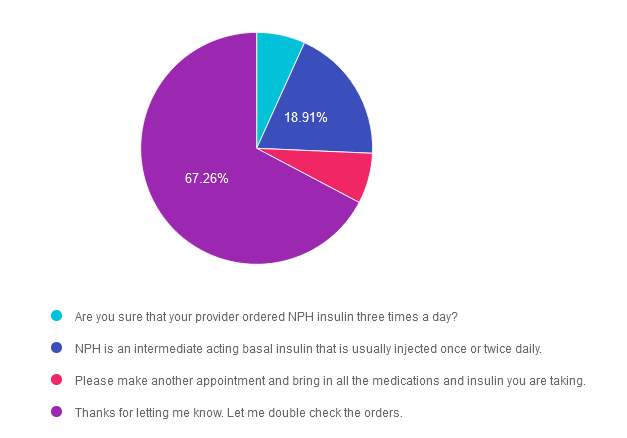
For last week’s practice question, we quizzed participants on reviewing insulin dosing adjustments. 67% of respondents chose the best answer. We want to clarify and share this important information, so you can pass it on to people living with diabetes and your colleagues, plus prepare for exam success!
Before we start though, if you don’t want any spoilers and haven’t tried the question yet, you can answer it below: Answer Question
Question: MR is 68 with type 2 diabetes and tells you that their provider increased their NPH insulin to three times a day and told them to adjust the NPH insulin dose based on their pre-meal blood sugar levels.
What is the best response?
Answer Choices:
- Are you sure that your provider ordered NPH insulin three times a day?
- NPH is an intermediate acting basal insulin that is usually injected once or twice daily.
- Please make another appointment and bring in all the medications and insulin you are taking.
- Thanks for letting me know. Let me double check the orders.

Getting to the Best Answer
If you are thinking about taking the certification exam, this practice test question will set you up for success. Test writers anticipate possible answers based on the details in the question. They will wave those “juicy answers” right under your nose. Your job is to weed through the particulars, pluck out the most important elements and choose the BEST answer.
Answer 1 is incorrect. 6.77% chose this answer. “Are you sure that your provider ordered NPH insulin three times a day?” This is not the best response, since it might make the individual feel like they did something wrong and put them in a defensive position.
Answer 2 is incorrect. 18.91% of you chose this answer. “NPH is an intermediate acting basal insulin that is usually injected once or twice daily.” This is a correct factual answer, but it is not the best answer since it summarizes how NPH insulin works, but doesn’t address the root of the issue or assist with problem solving.
Answer 3 is incorrect. About 7.06% of respondents chose this. “Please make another appointment and bring in all the medications and insulin you are taking.” Although “brown bagging” meds is always a good idea, this answer means that MR would continue giving NPH three times a day on a sliding scale until the next appointment is available. This delay of action could result in unstable blood glucose levels.
Finally, Answer 4 is correct. 67.26% chose this answer. “Thanks for letting me know. Let me double check the orders.” This affirmational, person centered answer is the best choice! It acknowledges MR’s concern and is followed by action to help with problem solving. GREAT JOB!
We hope you appreciate this week’s rationale! Thank you so much for taking the time to answer our Question of the Week and participate in this fun learning activity!
Want to learn more about this question?
Level 4 | Basal Bolus Therapy in Hospitals
Now Recorded & Ready to Watch

Basal Bolus Therapy in Hospitals Topics:
- Discussing appropriate insulin dosing based on the individual’s clinical presentation.
- Apply dosing strategies to a variety of case studies.
- Introduce hard-to-manage situations that commonly occur in hospital settings.
- A discussion of solutions that will keep people living with diabetes safe & get glucose levels to goal.
- Sample basal/bolus & insulin drip guidelines plus lots of resource articles are included.
Can’t make it live? No worries. We will send post the recorded version to the Online University within 24 hours of the broadcast
Instructor: Beverly Thomassian RN, MPH, CDCES, has been Board Certified in Advanced Diabetes Management for over 20 years. She is an Associate Clinical Professor at UCSF, a working educator, and a nationally recognized diabetes expert. She has a Master’s Degree in Public Health from UCLA, with a focus on behavioral health and education.
All hours earned count toward your CDCES Accreditation Information
Sign up for Diabetes Blog Bytes – we post one daily Blog Byte from Monday to Friday. And of course, Tuesday is our Question of the Week. It’s Informative and FREE! Sign up below!
The use of DES products does not guarantee the successful passage of the diabetes certification exams. CBDCE & ADCES does not endorse any preparatory or review materials for the certification exams, except for those published by CBDCE & ADCES.









